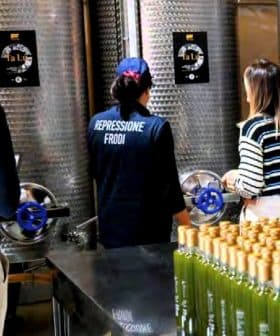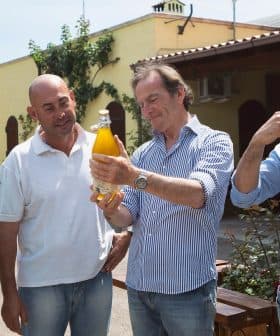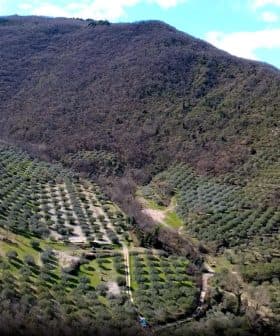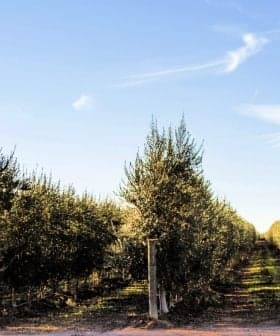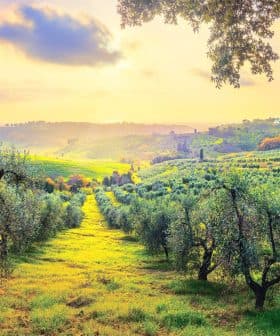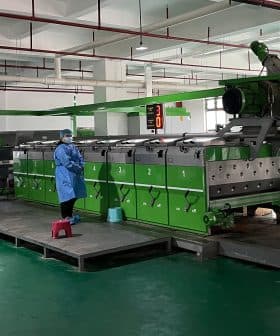Xylella-Resilient Groves Are the Future of Apulian Olive Oil
Farmers’ associations, researchers and institutions are teaming up to replant Xylella fastidiosa-resilient olive trees in Puglia.
 Associated Press
Associated Press Experts and researchers gathered in Lecce and Bari to discuss the future of olive oil production in Puglia, focusing on sustainable practices and the coexistence with Xylella fastidiosa. The new initiatives aim to replant Xylella-resistant olive trees, integrate various approaches to combat the bacteria, and promote the production of higher-quality olive oil in the region.
During a two-day event in Lecce and Bari, experts and researchers reviewed scientific findings and discussed the future of olive oil production in the Xylella fastidiosa-stricken region of Puglia.
Many native olive trees have been killed, but some have survived. If they are not severely affected, we must try to keep them alive until research enables their recovery.
Sustainably managed intensive olive groves of resilient cultivars, emphasizing high-quality production, emerged as the goal for farmers and millers in the southern Italian region where there is a growing consensus that the deadly bacterium cannot be eradicated.
“This visit is significant, as it showcases a rare example of virtuous collaboration between researchers and stakeholders who are actively contributing to our programs,” said Donato Boscia, a leading plant virologist at the Institute for Sustainable Plant Protection of the Italian National Research Council (CNR), to Olive Oil Times.
See Also:Balearic Islands Tighten Restrictions as Xylella Spreads in Mallorca“At this facility, there is a small olive germplasm conservation field, part of an ongoing genetic improvement program,” he added. “Additionally, there is a greenhouse funded by donations from Merum magazine readers, a climate chamber provided by Unaprol, and a new screen house funded by Save the Olives, the organization supported by Helen Mirren.”
Experts believe the new coordinated initiative offers hope for safeguarding existing olive groves and curtailing the further spread of the pauca subspecies of Xylella fastidiosa to unaffected territories.
Ten years after the emergence of the Xylella fastidiosa epidemic, which is widely believed to have triggered Olive Quick Decline Syndrome and killed millions of trees, Puglia remains the most significant olive oil-producing region in Italy.
“The presence of Xylella in the Apulian territory has reached extreme levels of complexity,” Boscia said. “New findings in central Puglia have identified other Xylella subspecies, such as Xylella multiplex, which is potentially dangerous for viticulture but not a significant issue for olives.”
“However, this complexity necessitates a multifaceted approach to containment and eradication efforts,” he added.
Farming and producer organizations such as Coldiretti, Unaprol and Cai Consorzi Agrari d’Italia have launched a project to assist olive growers in replanting Xylella-resistant varieties.
The goal is to plant around three million new olive trees, a fraction of the 21 million lost to Xylella. This initiative includes providing certified high-quality resistant plants, technical support for land preparation and specialized agronomic and phytopathological consultancy.
“The spread of Xylella has reached a point where eradication is no longer possible. We must learn to coexist with it,” said David Granieri, the president of Unaprol.
Boscia highlighted how extensive Xylella-monitoring operations have given researchers and stakeholders significant knowledge about the bacteria.
“This is the result of a surveillance program conducted by the Puglia region, which is unique worldwide, with over 250,000 analyses per year and 250 monitoring stations dedicated to vector monitoring,” he said, referring to the insect population, such as spittlebugs, responsible for spreading the bacteria.
“This activity is unsustainable in the long term and possibly even in the medium term. It is not exportable because you can’t ask other regions or countries to replicate it with the same amount of resources,” Boscia added, referring to the growing number of different strains of Xylella found throughout the Mediterranean.
“Still, those operations have provided substantial data compared to what was known a decade ago,” he noted.
Controlling vector insect populations goes hand in hand with agricultural practices and procedures that offer hope for the survival of olive trees in affected areas.
“Many native olive trees have been killed, but some have survived. If they are not severely affected, we must try to keep them alive until research enables their recovery,” said Giuseppe Lima, plant pathologist and professor at the University of Molise.
A veteran plant pathology researcher, Lima now coordinates the multidisciplinary research initiative Integroliv, which aims to counteract the effects of Xylella on olive growing in affected areas sustainably.
“To effectively counter such an insidious enemy, specific, single interventions in the region are insufficient,” he said. “Combining different approaches in complex protocols is crucial to maximize their effectiveness.”
See Also:New Spray Could Protect Olive Trees from Xylella“The new collaboration model is open to everyone,” Lima added. “Our approach aims to be a model of investigation and work, as we cannot expect a single project to encompass all possible competencies and solutions.”
“This approach ensures that new knowledge and techniques can be integrated into ongoing efforts to combat Xylella as they emerge,” he continued.
Several nationally-funded research projects, such as the Reach-Xy and Omibreed projects, aim to uncover what is behind Xylella’s genetic resilience, enhance biosecurity infrastructure, control vectors and promote sustainable water use in olive groves.
Other contributions at the event included the 1LiveXylella project, which is developing innovative technologies for Xylella diagnosis, and the SOS project, which focused on reducing the insect vector population.
“This event is a testament to the collaborative spirit of the scientific community and local stakeholders in Puglia,” Lima said. “It brings together expertise from across Europe to tackle a common challenge.”
He added that the new olive trees in Xylella-affected areas, currently represented by non-native varieties, must follow modern, rational agronomic management models to ensure their success.
These models will be based on four olive cultivars demonstrating high resistance to Xylella fastidiosa: Leccino, Lecciana, FS17 and Leccio del Corno.
“These varieties are resistant and tolerant but not immune,” Lima said. “This means we cannot be misled into thinking that, as in the past, we can simply plant olives and rely on good fortune.”
Continuous field management and monitoring will keep new semi-intensive and intensive olive plantations in good health and productivity.
“In these new forms of intensive and semi-intensive olive growing, phytosanitary problems will increase, requiring more fertilizers and phytopharmaceuticals than traditional methods,” Lima warned.
“The protocols [being developed] aim to counteract Xylella and other pathogens to keep the trees of both native and new varieties in good health and productivity,” he added.
According to Lima, the devastation caused by Xylella has harmed the Apulian landscape and identity. However, a new future can emerge from this adversity, characterized by higher-quality olive oil than in the past.
“In the Salento area, olives from those huge, magnificent trees were often traditionally collected from the ground, resulting in high acidity levels in the lampante oil,” Lima said.
“Tomorrow, with modern olive growing and the planting of rational, semi-intensive orchards, things can change,” he added.
In his view, the new groves will be able to consider the socio-economic aspects of modern olive growing, where a workforce can be hard to find and product quality becomes an essential equirement.
“Such modern olive growing will certainly lead to the production of better quality oil,” Lima said. “We are moving towards new forms of olive growing, which could bring more income to olive oil companies while contributing to the restoration of olive growing and the environment in areas affected by Xylella.”
Share this article


